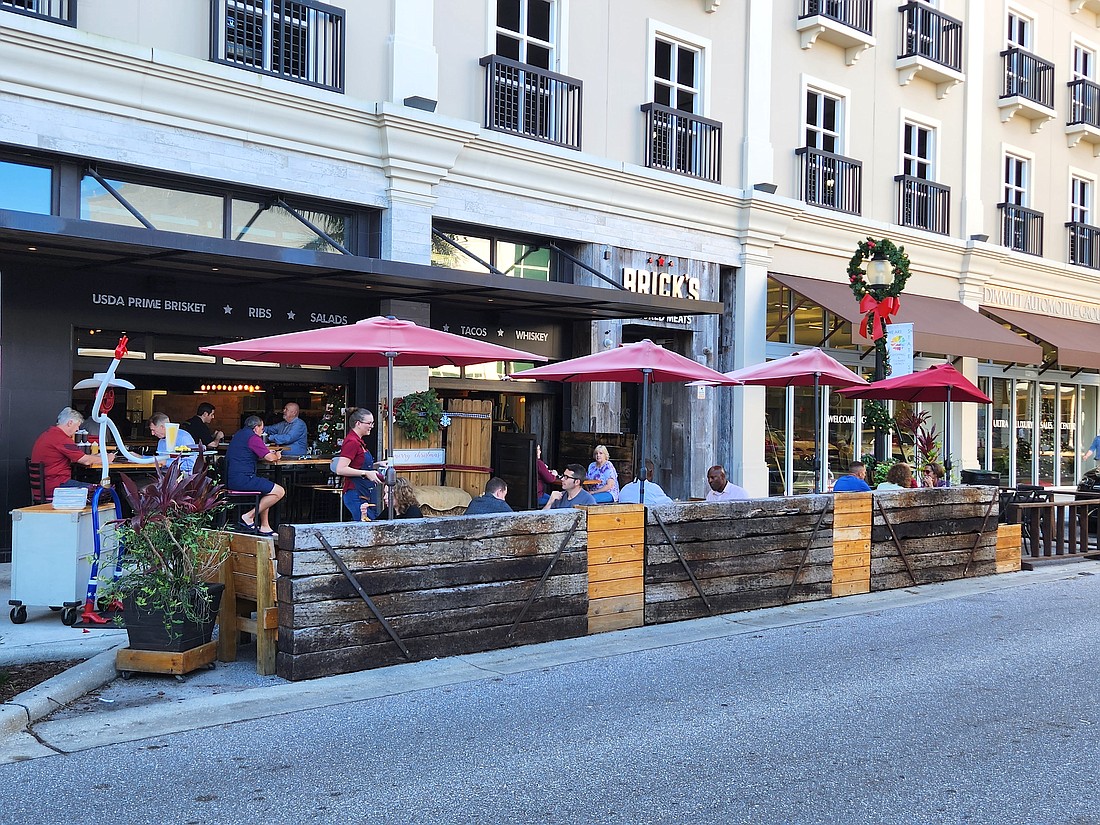- December 13, 2025
-
-
Loading

Loading

Pending Sarasota City Commission approval, a citywide parklet dining policy will be codified to go into effect when the current temporary extension that allows restaurants to set up tables in parking spaces on city streets expires on Sept. 30.
Gradually growing across the country for more than a decade, the parklet trend was turbocharged during the pandemic, as restaurants struggled to offer dining space to meet the comfort level of customers hesitant to dine indoors.
Today, seven Sarasota restaurants use parklets to expand their dining space, six in downtown and one in St. Armands. Installations range from permanent-looking extensions of the restaurant to parking spaces surrounded by metal barricades. City officials listened to restaurant owners who now depend on the parklets for revenue and on June 21 held an information session that laid out plans for design, aesthetic and maintenance standards — plus fees — that will be charged for the use of otherwise revenue-producing parking spaces.
Downtown restaurants using parklets occupy either one or two parking spaces, be they parallel or angled.
Although they will be permitted citywide, with one exception, parklets will likely be used primarily in downtown where restaurants don’t have the advantage of patio space enjoyed by their suburban counterparts. Parklets will not be permitted where a parking bond exists — an area where parking revenue is used to pay bond debt on a parking structure — specifically on and around St. Armands Circle.
In addition to assisting restaurants still in recovery from lost business during the pandemic, city staff has identified parklets as an enhancement to urban vitality.
“We're excited to explore the potential of parklets,” City Engineer Nik Patel says. “They are creative ways to transform parking spaces into vibrant community spaces.”
Parklets generate income for the restaurants but cost the city in parking revenue, so they will come at a price. One parklet space will cost $35 per day, or $12,600 per year based on a 30-day month. A second space will come at a discount, a total of $60 per day, or $21,600 per year, for two.
That cost includes lost parking revenue to the city and administrative costs to oversee the program. It doesn’t include, though, the cost to the restaurant to build parklets that conform to the new standards of aesthetics and diner safety. Parklet users must also have a sidewalk cafe permit, which costs $274 per year plus $5 per square foot of outdoor dining space used for sidewalk cleaning.
“Our primary goal is to ensure the process is transparent, fair and feasible for all stakeholders,” Patel says. “The permit process is designed to ensure adherence to all parklet standards while fees are structured to cover the necessary regulatory measures and maintenance, including parking fees.”
Parklet permits will be valid for two years, and not every restaurant will be eligible. The number of spaces available on any one block will limited to four, or 20% of all spaces, whichever is greater.
For example, the 1300 block of Main Street has 23 parking spaces. Allocating four spaces for parklets is 17%, which would be allowable. A fifth space, though, would constitute 22% and would not be permitted. Parklets will also not be allowed to block fire hydrants or other fire department facilities, or occupy any handicapped-dedicated spaces. There must also be a 4-foot separation between a parklet and an angled parking space. Wheel stops will be required to be installed, at the restaurant’s expense, between parallel parking spaces and parklets.
There will be multiple design standards required to address customer safety, cleanliness of the parklet and durability of materials and furnishings. All current parklet users will be required to upgrade their facilities to city-adopted standards.
Building contractor Mark Baldwin, who is also a partner in Lucile Pizza and Wine Bar on Main Street, says many restaurants will struggle to meet the costs associated with the proposed parklet standards, most of which have been borrowed from parklet policies of other municipalities.
“As somebody who knows exactly what's involved in what you’ve presented, it’s exceptionally involved and extremely costly,” Baldwin told staff members. “I'd say just based on what I've seen, it's at least $50,000 between permit fees, construction and the fees overall. I think that maybe some people in the community may not realize how little restaurants actually profit, and this seems very unfeasible as a whole.”
City officials say the standards, and costs, are necessary.
“It does have to be commercial and I understand the costs associated with that,” says Assistant City Engineer Dan Ohrenstein. "People are going to be sitting right next to a vehicle that's going to be right next to it, so public safety is important. Cleanliness is important. Also we do have storm events, so we want to make sure that the parklet is not going to fly off during hurricanes, so there are a lot of components to make parklets permanent, and that's why the standards have been put in place.”
This article originally appeared on sister site YourObserver.com.